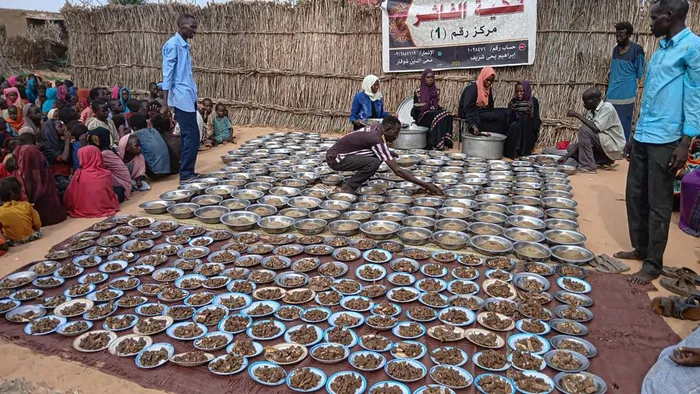
Sudanese volunteers prepare free meals for some of residents of Al Fashir, a city besieged by Sudan's paramilitary Rapid Support Forces (RSF) for more than a year, in Darfur region. Al-Fashir is the last city in the western Darfur region still held by the Sudanese army, at war with the paramilitary group since April 2023.
Image: AFP
In the Tawila camp for displaced persons in Darfur, eight-year-old Sundus sits surrounded by burlap sacks and an ocean of sand.
The horrors of war have made her understand more than a child should.
There are no toys to play with, no school lessons to attend, no little dreams to share with her family or peers—only the daily struggle of displacement under the echo of gunfire and death, according to a report published by the United Nations in mid-August 2025.
Sundus recounted to the UN how she and her family fled the besieged city of Al-Fashir, the capital of North Darfur, after surviving for weeks on nothing but millet.
“Hunger forced us to leave,” she said, explaining that shells kept falling on the city where “only hunger and bombs remain.”
The city remains cut off from the World Food Programme and other humanitarian aid. The hunger crisis comes just one year after famine was officially declared in Sudan, according to the United Nations.
Meanwhile, the UN Office for the Coordination of Humanitarian Affairs (OCHA) in Sudan announced on Wednesday that access to Al-Fashir remains severely restricted amid growing needs and a dwindling ability to respond, Darfur 24 reported.
The Sudan Founding Coalition (“Ta’sis”) had earlier declared its readiness to allow humanitarian aid into Al-Fashir to prevent a catastrophe, but that effort faltered due to the non-cooperation of the Port Sudan camp.
In a related development, the World Food Programme (WFP) confirmed that the Port Sudan Foreign Ministry had expelled its country director and emergency coordinator—declaring them personae non gratae and ordering them to leave within 72 hours—without explanation.
In a statement on October 29, 2025, the WFP said the expulsion came “amid the world’s largest and most complex humanitarian crisis,” precisely when the agency and its partners “need to expand operations”.
The organisation warned that the decision would force unplanned leadership changes and jeopardise operations supporting millions of vulnerable Sudanese “facing extreme hunger, malnutrition, and the risk of starvation”.
Senior UN officials, it added, were engaging the authorities to protest the decision and seek clarification, urging “all parties to prioritise the lives and safety of the millions who depend on emergency food and nutrition assistance to survive”.
The agency reaffirmed its “steadfast commitment to supporting the people of Sudan and ensuring their access to life-saving aid amid unprecedented levels of hunger, insecurity, and humanitarian need.”
As UN bodies warn of an impending humanitarian catastrophe in Al-Fashir, the Darfur regional government—appointed by the Ta’sis coalition—issued a call for “international, regional, and national humanitarian organisations to urgently deliver aid to those affected in Al-Fashir and surrounding areas”.
It expressed full readiness “to facilitate the delivery of assistance and ensure the safety of humanitarian workers”.
In an official statement on October 28, 2025, the government voiced “deep concern over the rapid deterioration of humanitarian conditions in Al-Fashir, caused by ongoing hostilities and restrictions on aid convoys, leading to acute shortages of food, medicine, and clean water”.
It reiterated its “full commitment to protecting civilians and ensuring their safety”, adding that it continues to coordinate “with local authorities, community leaders, regular forces, and the federal police to enhance stability and prevent any abuses or violations against citizens and their property”.
In June 2025, a World Food Programme convoy carrying humanitarian aid to Al-Fashir was attacked near the town of Kuma, about 80 kilometres east of the city, resulting in the burning and destruction of several trucks and the deaths of several drivers.
The Kuma Emergency Committee reported that drones belonging to the army in Port Sudan targeted the WFP trucks, killing six drivers, injuring four others, and destroying multiple vehicles.
Local tribal leaders from the Kuma area confirmed in a recorded statement on the committee’s official Facebook page that the 17-truck convoy carrying essential food supplies was struck around 12.30am by drone fire from the Port Sudan army.
In August 2025, Sudanese reports indicated that army warplanes from Port Sudan bombed another WFP relief convoy in Mellit, northern Darfur.
The convoy consisted of 16 trucks carrying life-saving food supplies; three trucks were completely destroyed by fire, according to WFP spokesperson Gift Watanasathorn, who confirmed that humanitarian staff were unharmed.
The Ta’sis government condemned what it called “the treacherous aggression by the warplanes of the Islamic Movement’s terrorist army,” saying the attack also struck Mellit’s market and customs post, killing and injuring dozens of civilians.
It urged the international community and humanitarian organisations to “unequivocally condemn this criminal assault” and called for an urgent investigation to hold those responsible accountable, stressing “the need for immediate pressure to stop the Sudanese army’s attacks on humanitarian workers”.
Following the liberation of Al-Fashir on October 26, 2025, Port Sudan–aligned media outlets launched intensive campaigns alleging massacres against civilians in the city.
However, investigations based on field testimonies revealed that the killings were carried out by an unidentified militia linked to the Port Sudan army and its mercenaries—apparently to divert public attention from their battlefield losses.
In this context, the Ta’sis government announced on October 28, 2025 the formation of investigative committees to verify the authenticity of videos purporting to show such crimes in Al-Fashir.
“We in the Ta’sis Coalition reaffirm our condemnation of any violations and our efforts to stop them, as repeatedly declared by our military and political leaders,” the statement said.
It added that the coalition “will continue to liberate Sudan from this terrorism, with hands extended for peace—but a peace that safeguards Sudan’s unity, the dignity of its people, and their freedom from the tyranny and injustice of the Muslim Brotherhood, its militias, and its army”.
The alleged massacres coincided with others no less horrific in El-Obeid, North Kordofan, where the army executed unarmed civilians by beheading and gunfire, mutilating their bodies.
The victims belonged to tribes accused of supporting or harboring the Rapid Support Forces aligned with the Ta’sis coalition.

Bayethe Msimang explores the dire situation in Sudan, and the ravages of the ongoing conflict as a humanitarian crisis unfolds.
Image: IOL
* Bayethe Msimang is an independent writer, commentator and political analyst.
** The views expressed do not necessarily reflect the views of IOL or Independent Media.
Related Topics: